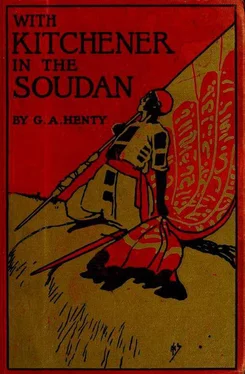" That was so. Two days afterwards we surrounded' them. They fought hard, and at last, when we had lost many men, we offered that if they would surrender and become the Mahdi's men they would be spared. Most of them did so, just as some of our tribesmen taken by you at Atbara have now taken service with you."
"But the white officer—what became of him?'
"I cannot say," the native said. "I have no memory of him. He may have fallen before they surrendered—who can say ? Certainly I do not remember a white man being killed after they did so. I will ask others who were there, and to-morrow will tell you what they say."
It was a busy day in Omdurman. The army that had made such efforts and achieved so great a triumph marched in military order, with bands playing, through the town. The Sirdar had a double motive in ordering them to do so. In the first place, it was a legitimate triumph of the troops thus to march as conquerors through the town; in the second place, the sight would impress not only the inhabitants but the Dervish prisoners with a sense of the power of those who henceforth would be their masters, and undoubtedly the show had the desired effect. The orderly ranks as they swept along, the proud demeanour of the men, their physique and equipment, created a profound impression among the natives. Half of them were their own kinsmen, many of whom had fought for the Khalifa and had now aided in defeating him. This was what had been accomplished by drill and discipline, and the influence of white officers. The Soudanese were evidently well fed and cared for; not even the haughty Baggara held their heads so high.
Especially admired were the artillery, battery following battery in perfect order. These were the guns that had carried death into the ranks of the Dervishes, against whose fire even the fanatical bravery of the followers of the Khalifa was unable to stand. When the march past was concluded there was scarce one of the prisoners who Avould not gladly have enlisted. On the following day Gregory again went to the Praying Square. The man he had the morning before seen, at once came up to him.
"I have enquired of many who were at El Obeid, my lord," he said. " All say that there was no white man in the camp when the black battalion surrendered, though one had been seen while the fighting was going on; nor was the body of one found where the fight had taken place on the previous day. It was a matter of talk among the Dervishes of the time, for they had lain in a circle round the enemy, and were convinced that no one passed through their lines. Those who surrendered said that he had taken the command, and had exposed himself to the hottest fire and encouraged them, telling them that the more bravely they defended themselves the more likely they were to obtain favourable terms. The night before, he had advised them to accept any offer the Dervishes might make, but on the following morning he was missing, and none could give any account of what had become of him. The same tale is told by all to whom I have spoken."
The story made a profound impression upon Gregory. It seemed possible that the father of whom he had no remembrance might have been the sole white survivor of Hicks's army. True, there was nothing to prove that he was the white man who had joined the black battalion that escaped the first day's massacre. There were other non-combatants, Vizitelly, the artist of the Illustrated London News, and O'Donovan, the correspondent of the Daily News. Either of these might also have been at any other portion of the square when the attack commenced, and unable to join Hicks and his officers in their final charge into the midst of the enemy. Still, it was at least possible that his father was the man who had retired from the field with the black battalion, and who had afterwards so strangely disappeared. If so, what had become of him all these years ? Had he made off in disguise only to be murdered by wandering bands? Had he been concealed for months in the hut of a friendly tribesman? What had he been doing since? Had he been killed in trying to make his way down? Had he been enslaved, and was he still lingering on in a wretched existence? He could hardly hope that he had fallen into friendly hands, for had he been alive he would surely have managed, with his knowledge of the country, to make his way down, or to reach Khartoum when it was still held by the Egyptians.
At any rate Gregory concluded that he might find out whether any European had arrived there during the siege. He went down to the river and took a native boat across to Khartoum. At the ceremony on Sunday many natives watched the arrival of the flotilla, and some of these might have been there in Gordon's time. He had no great hopes of it, but there was just a chance. The flags were still flying over the governor's house when he landed, and a detachment of Egyptian troops was stationed there. A native officer came down when he landed.
"I have come across to question some of the natives," he said. "I believe some are still living here."
" Oh, yes, bimbashi! there are a good many scattered about among the ruins; they come in bringing fruit and fish for sale. I think they mostly live down by the river-side."
Gregory kept on till he came to the huts occupied by the fishermen and men who cultivated small plots of ground. He found several who had lived at Khartoum when it was captured, and who had escaped the general massacre by hiding till nightfall and then making their way up the river in boats. None of them could give him the information he sought, but one suggested that he was more likely to hear from the Greeks and Turks who worked in the Khalifa's arsenal and foundries, as they had been spared for the services they would be able to render to the Mahdi. Eeturning to Omdur-man he went to the machine-shop. Here work had already been resumed, as repairs were needed by several of the gunboats. He went up to the foreman, a man of some sixty years of age.
" You were engaged in the city during the siege, were you not?" he said in Arabic, with which he knew the foreman must be thoroughly acquainted.
" Yes, sir, I had been here ten years before that."
" I am very anxious to learn whether any white man who had survived the battle of El Obeid ever reached this town before its capture."
The man thought for some time. "Yes," he said, "a white man certainly came here towards the end of the siege. I know, because I happened to meet him when I was going home from work, and he asked me the way to the governor's. I should not have known him to be a white man, for he had a native attire and was as black from exposure to the sun as any of the
Arabs. I gave him directions, and did not ask him any questions; but it was said afterwards that he was one of Hicks's officers. Later, I heard that he went down in the steamer with Colonel Stewart."
"You did not hear his name?" Gregory asked anxiously. "No, sir."
"Did he talk Arabic well?"
"Extremely well; much better than I did at the time." " Do you remember how long he arrived before the steamer started?"
"Not very long, sir, though I really cannot tell you how long it was."
"After you were cut off, I suppose?" " Certainly it was, but I cannot say how long." " No one else here would know more about it than you do ?" "No, sir; I should think not. But you can ask them." He call i up some of the other workmen. All knew that a white officer of Hicks Pasha's army was said to have returned. One of them remembered that he had come down once with Gordon to see about some repairs required to the engines of a steamer, but he had never heard his name, nor could he recall his personal appearance, except that he seemed to be a man about thirty. But he remembered once seeing him again on board Stewart's steamer, as they had been working at her engines just before she started.
Читать дальше












